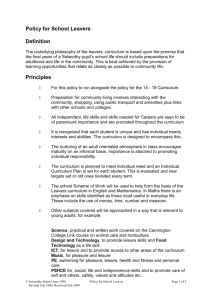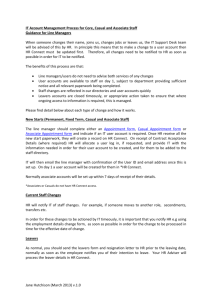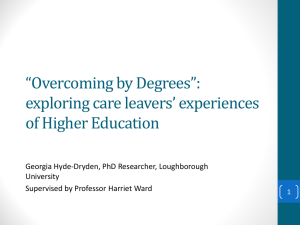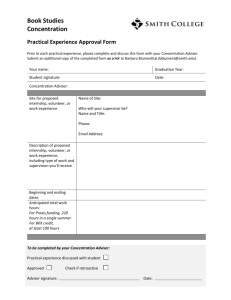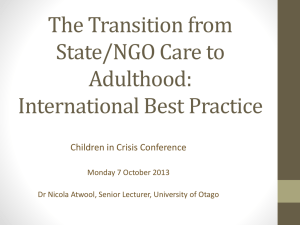Know your rights, know your benefits
advertisement
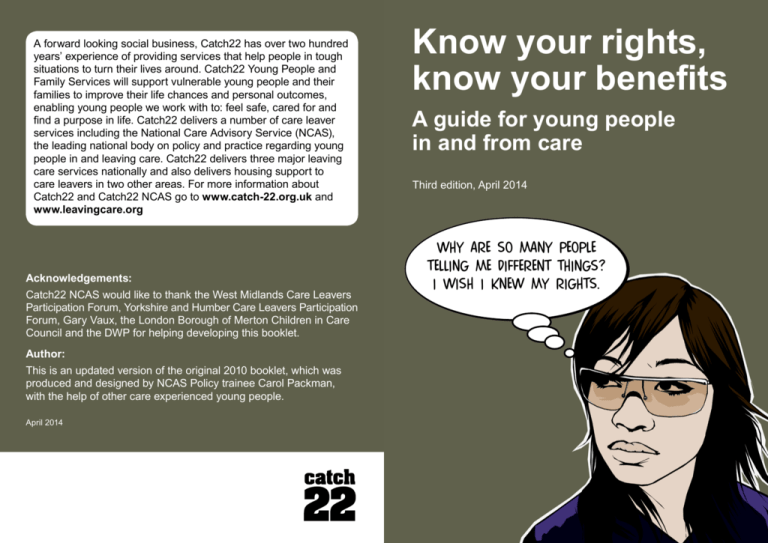
A forward looking social business, Catch22 has over two hundred years’ experience of providing services that help people in tough situations to turn their lives around. Catch22 Young People and Family Services will support vulnerable young people and their families to improve their life chances and personal outcomes, enabling young people we work with to: feel safe, cared for and find a purpose in life. Catch22 delivers a number of care leaver services including the National Care Advisory Service (NCAS), the leading national body on policy and practice regarding young people in and leaving care. Catch22 delivers three major leaving care services nationally and also delivers housing support to care leavers in two other areas. For more information about Catch22 and Catch22 NCAS go to www.catch-22.org.uk and www.leavingcare.org Acknowledgements: Catch22 NCAS would like to thank the West Midlands Care Leavers Participation Forum, Yorkshire and Humber Care Leavers Participation Forum, Gary Vaux, the London Borough of Merton Children in Care Council and the DWP for helping developing this booklet. Author: This is an updated version of the original 2010 booklet, which was produced and designed by NCAS Policy trainee Carol Packman, with the help of other care experienced young people. April 2014 Know your rights, know your benefits A guide for young people in and from care Third edition, April 2014 why are so many people telling me different things? i wish i knew my rights. What is in this guide? Need help paying your rent? pages 13–14 Introduction Need help paying your council tax? page 14 page 4 How do I make a benefits claim? What leaving care support should I receive? page Need help setting up your first home? page 15 4 pages 5–6 What benefits are there? pages pages pages Looking for work Are you a parent? Are you ill or disabled? 18–19 6–7 pages Are you seeking asylum? 8–9 page Benefit sanctions pages Are you studying? 9–10 pages 11–12 16–17 Useful websites and organisations 20 pages 21–22 Catch22 NCAS resources page 23 Introduction How do I make a benefits claim? This booklet aims to help care leavers in England understand the support available within the benefit system. The type of benefits you can claim depends on your circumstances. Your leaving care personal adviser should help you with your initial claim. This may involve: Special benefit rules apply to care leavers. In general, local authorities are responsible for supporting young people in and from care up to the age of 18 by paying for accommodation and living costs. The only 16 and 17 years olds in and from care that may be able to claim benefits are young parents and disabled young people. After 18 the local authority may still give you further financial support, but they are not expected to be your main source of income. Like all young people you would get your income from work, education grants and, if you are eligible, benefits. You are expected to claim these to help support yourself. What leaving care support should I receive? Your local authority should make sure that you have a personal adviser, who should keep in touch with you and support you to achieve the things that are set out in your pathway plan. The pathway plan is a document which identifies your needs and how the local authority will help you meet these. This can include financial assistance especially with education, employment, and training. 4 • helping you with phone calls; • registering the initial claim; • coming along to Jobcentre appointments; • completing online forms; and • providing supporting documents and letters. Some leaving care services have specialist welfare right advisers that can help you with benefits applications. You will need identification documents and a bank account for the benefits to be paid into. Your personal adviser should help you to get these if needed. Advance claims prior to 18 If you know that you will be claiming benefits once you turn 18 some leaving care teams have arrangements with their local benefits offices so that you can set up your claim before your birthday. This should help reduce delays in payments and make sure that everything is set up. Talk to your leaving care service to see if this is available in your area. Paper claims – The Department for Work and Pensions (DWP) are mainly doing claims online. You can still call and request a paper claim if you prefer, but in some areas they will encourage you to use the online system. 5 Let the Jobcentre know you are a care leaver Jobcentre Plus (JCP) are trying to make it easier for care leavers to claim benefits. To do this they need to know who is a care leaver, so they can provide extra support or see if particular systems work for young people leaving care. They can only do this if you let your JCP Adviser know that you are a care leaver, but you do not have to do this. This booklet gives you an idea of some of the extra support you can get as a care leaver, so that you can decide whether you want to let them know. Free calls from a mobile – You will not be charged for calls to 0800 benefit claim numbers from a mobile with most companies. If your mobile company is not part of the scheme the DWP will offer a call back. What benefits are there? The benefits you can get depend on your circumstances, for example, if you are working, are disabled or have children. The Government is also currently changing the system so that many different benefits will be combined under a new benefit called Universal Credit. UC is a single monthly payment for those out of work or on a low income. It includes help with your rent as well as living costs. How will you be paid? Under UC you will have to learn to budget your money, because: be paid once a month into your bank, building society • Itorwill Post Office account. you live in a couple or as a family your UC will be paid • Iftogether as one household. • You have to pay your rent yourself from the UC you get. Did you know? If you think you will struggle to manage your Universal Credit payments, you can ask your Jobcentre for help, such as: • Personal budgeting support. • Have your rent paid straight to your landlord. • Being paid more often. • Have payments split between members of the household. If you tell the Jobcentre that you are a care leaver they should give you priority for this support. Universal Credit will be introduced in stages across the country over the next few years. Universal Credit From April 2013 until 2017 some of the benefits mentioned in this booklet (such as Housing Benefit, Income Support, Jobseekers Allowance (JSA), Employment and Support Allowance (ESA), Tax Credits) will be replaced by Universal Credit (UC). 6 7 Looking for work? Unless you have moved onto Universal Credit, Jobseeker’s Allowance (JSA) will give you money to live on when you are unemployed. Who can make a claim? If you are 16–17 years old, you can’t claim Jobseeker’s Allowance, as your local authority should pay for your maintenance. If you are 18 or over you can get Jobseeker’s Allowance if you are: • available for and actively seeking work, or studying for less than 16 hours per week on average • working (but what you earn will affect the amount of JSA you get). Job Seekers Agreement or Claimant Commitment You will have to agree with your Jobcentre Plus (JCP) adviser what you will do to find work. You will need to show that you have looked for work and be available to go to job interviews, or attend appointments at short notice. Other things you may be expected to do could include: • • Attending courses • Applying for job vacancies • Work experience • Mandatory work activity Preparing a CV How do I apply for JSA? You can apply online at www.gov.uk/jobseekers-allowance/ how-to-claim or by phoning 0800 055 6688. Did you know? The Jobcentre has programmes that give extra support to find work. You can, for example, take up work experience to improve your employment skills or they can refer you to further training and you can still continue to claim benefits. Work Programme is a two year • The programme to provide additional help to find work. Everyone who has been unemployed for 12 months has to go on the Work Programme, but if you are a care leaver you can start this after three months unemployment if you want to. If you start the Work Programme and you do not engage with it, you may be sanctioned and lose JSA for a period of time. Youth Contract involves extra support for unemployed • The young people. Care leavers can access this at 16 and 17 if they are not in education, employment or training. There is also extra support for older young people. Benefit sanctions To keep getting JSA you must go to a Jobcentre (usually every 2 weeks or when asked) to show how you’ve been searching for a job. This is known as ‘signing on’. 8 Young people who don’t follow their Jobseeker’s Agreement or Claimant Commitment; miss appointments; leave a job without a good reason; or are dismissed may be subject to a benefit sanction. This means that during that time your JSA will be stopped, but you may be able to claim hardship payments. 9 How long can I be sanctioned for? on what you’ve done (or not done) and whether this • Itis depends a first offence or not. start with you’ll be put on the lowest level of sanctions. • To This means losing your benefit for 4 weeks. you break the terms of your Jobseeker’s Agreement/Claimant • IfCommitment again within a year, you’ll lose your benefit for 13 weeks. you leave a job voluntarily or are dismissed for misconduct • Ifrepeatedly you could lose your benefit for between 13 weeks and three years. What should I do if I am sanctioned? • If you think the sanction is unfair you can ask for a review. your review is unsuccessful, you can appeal using the • IfGL24 form available on www.gov.uk • Apply for hardship payments through your JCP adviser. advice – e.g. talk to your leaving care personal adviser or • Get Citizens Advice Bureau. • Find out about other local support such as food banks. a ‘nil income’ claim if you’re on housing benefit (HB) to • File avoid your JSA sanction impacting on your HB. turning up for Jobcentre plus appointments, job search and • Keep fulfil other commitments or you could be sanctioned for longer. Plan ahead to avoid sanctions – if you have any problems attending appointments or other commitments let the Jobcentre know as soon as possible. For example, keep your JCP adviser’s number with you so you can call them if your bus is late and you won’t make your appointment. 10 Are you studying? Are you at college or in other training? If you are a care leaver aged 18 or over, living away from your family and are studying full-time non-advanced education (up to and including A Level and equivalent) you can claim Income Support and Housing Benefit on the grounds of being estranged from your family. You can enrol at any time up to your 21st birthday and can continue to receive these benefits up to the end of your studies or the end of the academic year in which you become 21, whichever is earlier. This help is also available to you if you have stayed-on with your former foster carers. This system will continue under Universal Credit. Did you know? You might also be able to get financial support of £1200 a year direct from your school, further education college and learning provider. The 16–19 bursary is guaranteed for care leavers aged 16 to 19, and discretionary learner support can support older students. Talk to your school, college or learning provider to find out more. parents and sick and disabled • Single young people can usually continue to claim income-based benefits such as income support and ESA whilst studying full-time in further education. UC will replace these benefits over time. to Learn helps with the cost of your • Care childcare while you’re learning if you are under 20. 11 Did you know? Need help paying your rent? Your local authority should provide you with financial assistance to the extent that your education or training needs require it. Housing Benefit can help pay for all or part of your rent. Once you claim Universal Credit, housing costs will be included in this. Who can make a claim? University • If you attend higher education you can get student funding (student loans and grants), and usually won’t be able to claim benefits. But some part-time students on low incomes, parents and disabled students may still get benefits. local authority should give you support with university • Your through the leaving care service. You should get a Higher Education (HE) Bursary, accommodation during the vacations and they often help with other costs. Talk to your personal adviser to find out more. Finance manage student loans and grants. In addition • Student to loans to pay for tuition fees and living costs you can get a maintenance grant. Maintenance grants do not have to be paid back. Did you know? There are also many bursaries to encourage young people from disadvantaged background to go to university, including care leavers. The Who Cares? Trust produces a HE Handbook giving an overview of different universities’ support to care leavers www.thewhocarestrust.org.uk 12 You could qualify if you are not working, studying part-time or on a low wage. Care leavers must be 18 or over to claim. How to claim? If you’re not claiming any state benefit, contact your local council to claim Housing Benefit. If you do claim a benefit through Jobcentre Plus, they will take details of your Housing Benefit claim at the same time and pass this on to your council. Managing your rent payments Most young people who live in private rented accommodation will get their benefit paid into their bank account and are expected to pay their landlord. Once you claim Universal Credit, this will also be true if you live in social housing. If you think it would be difficult to manage your rent payments you can request to have the benefits paid straight to your landlord. Tell the DWP at your first interview that you are a care leaver and they should give you priority for ‘alternative payment arrangements’, such as payments direct to your landlord. You could discuss this with your personal adviser who can help you to decide what arrangements are best for you. 13 Did you know? When you go back to work, work more hours or earn more money, some of your benefits may stop. To help you pay your rent or council tax you may get an extra four weeks of Housing Benefit. This is called Housing Benefit run-on and may be available if you were on certain benefits for at least 26 weeks before you started work. Ask your council for more information. Do you rent privately? Young people under 35 who live in private rented accommodation and are single are normally only entitled to rent payments equivalent to the cost of a room in a shared house – the shared accommodation rate. Care leavers between 18 and 21 can get the rate for 1-bedroom accommodation instead, but once you turn 22 you can only get the shared accommodation amount. Bear this in mind if you are moving into a new home and think that you will continue to claim benefits after 22. Did you know? If you are likely to have problems paying your full rent because of the shared room rate once you turn 22 you can approach the council and ask for Discretionary Housing Payments. These are not guaranteed, but the council may be able to help you for a period of time until you find other accommodation or earn enough to pay your rent yourself. Need help paying your council tax? Local councils have schemes to help people who struggle paying their council tax. These Local Council Tax Reduction schemes have replaced Council Tax Benefit and Second Adult Rebate. Contact your council for more information and to see if they can help you. 14 Need help setting up your first home? You can no longer apply for Community Care Grants or Crisis loans but your council will provide some help through their local welfare assistance scheme. Budgeting loans could get a Budgeting Loan • You to help pay for essential things like rent, furniture, clothes or hire purchase debts. smallest amount you can • The borrow is £100. Loans are interest-free so you only pay back • Budgeting what you borrow. You normally have to repay the loan within 104 weeks. can apply for a loan if you’ve been getting income-related • You benefits for at least 26 weeks. Setting up home allowance (leaving care grant) Most councils provide financial support for care leavers moving into more independent living to buy essential items that you’ll need in your new home. What you get should be set out in the financial policy of the local authority responsible for you. The Government has written to all councils to encourage them to pay at least £2,000, but it is still up to the council to decide how much they pay. Ask your leaving care service for more details. If you start saving in advance this will help you buy the things you want. 15 Are you a parent? You could be entitled to… Income Support is for people who don’t have to sign on as unemployed. You can claim this aged 16 or 17 if you are responsible for a child. Income Support can be claimed from 11 weeks before the due birth date, unless you are still in school or college. In that case, you will have to wait till the baby is born. Income support will be included in Universal Credit. Healthy Start Vouchers are weekly vouchers, which can be used to buy liquid milk, infant formula or fresh fruit and vegetables in general retail outlets. Child Benefit is a tax-free payment that you can claim for your child. If you are still in care you can get Child Benefit if your child is living with you, for example with a foster carer, even if your child is also in care. Sure Start Maternity Grant is a one-off £500 payment to help with the costs of your first child. You do not have to pay it back. 16 Junior Individual Saving Accounts for Looked after Children provide savings for children in care. See www.sharefound.org or ask your personal adviser for more information. If you have been working (even, for example, a weekend job) you could be entitled to either Statutory Maternity Pay from your employer or Maternity Allowance from the Jobcentre. It depends on the length of time you have been employed, and the amount of money you have been earning. Child tax credits are payments you can claim if you have a child. The lower your income, the more tax credit you can get. If you go out to work, you might get Working Tax Credit too, which can help towards your child care costs. These will be included in Universal Credit. 17 Are you ill or disabled? PIP has two components ‘care’ and ‘mobility’. Each are paid at different rates depending on what your needs are. Care leavers who are ill or disabled may be able to claim certain benefits when 16 and 17. Once you turn 18 the same rules that apply to other young people apply to you. Daily living difficulties Employment and Support Allowance (ESA) ESA is a benefit for sick or disabled people who cannot work. Who can make a claim? can claim ESA when you are 16 and • You 17, but you can’t get Housing Benefit as your local authority should still provide or pay for your accommodation. get ESA you will normally have to have • To an assessment to see if you can work. You will need a medical certificate (called a ‘fit note’) from your GP showing why you can’t work, or have a condition that exempts you from the medical assessment. Personal Independence Payment (PIP) PIP helps with some of the extra costs caused by long-term ill-health or a disability if you’re aged 16 to 64. You may get the daily living component of PIP if you need help with things like: • preparing or eating food. • washing, bathing and using the toilet. • dressing and undressing. • reading and communicating. • managing your medicines or treatments. • making decisions about money. • engaging with other people. Mobility difficulties You may get the mobility component of PIP if you need help with going out or moving around. For more information Call the Benefit Enquiry Line: 0800 88 22 00 Textphone: 0800 24 33 55 You’ll need an assessment to work out the level of help you get. Your award will be regularly reassessed to make sure you’re getting the right support. Who can make a claim? must have a long-term health condition or disability and have • You difficulties with activities related to ‘daily living’ and or mobility. must have had these difficulties for 3 months and expect • You them to last for at least 9 months. 18 19 Are you seeking asylum? Useful websites and organisations You will be able to claim benefit once you have been granted ‘refugee status’, ‘humanitarian protection’ or ‘discretionary leave to remain’. People in these categories will cease to be asylum seekers. www.gov.uk The latest news and information on benefits will be available on this national website. You can search for individual benefits and use the ‘benefits adviser’ interactive tool that can help you find out what benefits and tax credits you may be entitled to. Many care leavers who have come to the UK on their own seeking asylum get ‘discretionary leave to remain’ until 17½ and when this expires it affects rights to benefits. You must apply for an extension of discretionary leave to remain before it expiries to be able to claim benefits. Talk to your personal adviser or a benefit specialist to make sure your claim is ok. www.leavingcare.org The latest news and information on all issues relating to transitions from care and care leavers are available on Catch22 NCAS website. Benefit Enquiry Line A telephone advice and information service you can call if you are sick or disabled or if you are caring for someone and acting on their behalf. T: 0800 88 22 00 Textphone: 0800 24 33 55 Citizens Advice Bureau Helps people resolve their legal, money and other problems by providing free advice. T: 0870 84080808 E: enquiry@cabline.org W: www.citizensadvice.org.uk Shelter housing advice helpline Shelter provides a free, national telephone advice line staffed by trained housing advisers. T: 0808 800 4444 (8am–midnight 7 days per week, Freephone) E: info@shelter.org.uk W: www.shelter.org.uk 20 21 Turn2us Helps people access the money available to them – through welfare benefits, grants and other help. They have a benefits calculator on their website that you can use to work out what benefits you could be entitled to. Freephone: 0808 802 2000. W: www.turn2us.org.uk Voice A children’s advocacy organisation for children living away from home or in need that provides a national helpline. Freephone: 0800 800 5792 E: help@voiceyp.org W: www.voiceyp.org The National Youth Advocacy Service (NYAS) NYAS offer information, advice, advocacy and legal representation to children and young people through a network of advocates throughout England and Wales. Freephone: 0300 330 3131 E: help@nyas.net W: www.nyas.net The Who Cares? Trust They have produced a range of resources for professional and young people, including the HE handbook. W: www.thewhocarestrust.org.uk The Share Foundation They administer the Junior ISA for looked after children. W: www.sharefound.org Migrant Children’s Project at Coram Children’s Legal Centre Provide one-to-one advice around asylum and migration issues through an advice line and outreach advice work, a range of free resources and online information, and training to practitioners working with young refugees and migrants. Legal Advice Line: 020 7636 8505 E: mcp@essex.ac.uk W: www.childrenslegalcentre.com 22 Catch22 NCAS resources Useful resources from Catch22 NCAS for young people in and from care available on www.leavingcare.org Support for care leavers age 21–25: A booklet that provides information and advice for young people about the duty to support care leavers with their education and training to 25. GETA Guide: This guide has been produced to help you and other care leavers gain information about emergency and temporary accommodation and understand what your housing rights are. A Guide to Employment for anyone starting out in employment: This handbook has been designed to prepare and support you into employment, and has been written in consultation with young people and care leavers who have experienced a variety of employability opportunities. Work experience guide for young people: This guide was created to help and explain what you should expect to happen throughout your work experience placement. CV hints and tips for young people: This booklet was created to help you develop your CV. 23

